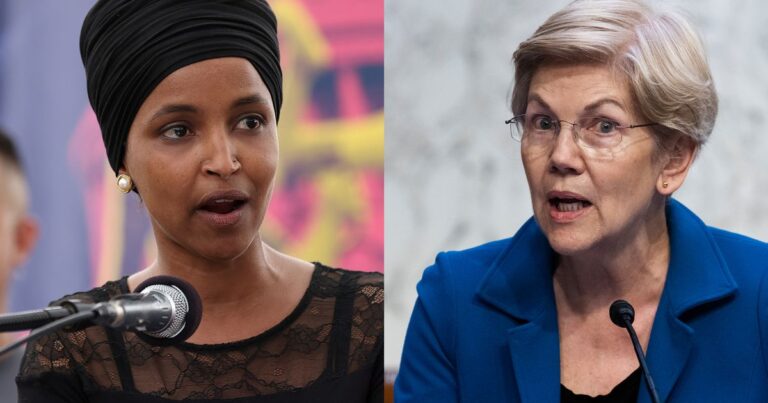
[ad_1]
Rep. Ilhan Omar (D-Minn.) and Sen. Elizabeth Warren (D-Mass.) released a letter on Friday urging the head of U.S. banking regulators to reassess policies that actively discriminate against Muslim Americans and communities of color.
“Countless U.S. individuals, businesses, and charities have been victims of discriminatory policies and practices that appear to limit their access to financial services because of their religion or national origin,” reads the letter signed by over a dozen lawmakers. The letter was exclusively shared with HuffPost before being sent to Treasury Secretary Janet Yellen and other banking officials.
“Many Muslim and Arab, Middle Eastern and South Asian Americans, simply because of their connections — real or perceived — have been systematically cut off from financial services,” the lawmakers wrote.
For American Muslims and individuals from countries impacted by U.S. sanctions, operating a bank account or sending money abroad has resulted in a litany of challenges that many say are disproportionate and discriminatory. People say they have been targeted by financial institutions based on their religious and ethnic origin, including having their bank accounts shut down without warning, their payments to loved ones abroad flagged and their accounts being unfairly scrutinized.

Tom Williams/CQ-Roll Call, Inc via Getty Images
In 2019, a Muslim woman filed a complaint against Citibank in New York after the bank allegedly prevented her from opening an account, saying they first needed to investigate her husband, who has an Arabic last name. In 2017, a Muslim man, his wife, and his 15-year-old daughter were detained by police when a teller called 911 as he tried to deposit a check.
Muslim Americans who run nonprofits have also said that their charities have been shut down without reason. A 2014 report by The Los Angeles Times found about a dozen account closures involving Muslims and immigrants from the Middle East and their nonprofits.
“I have heard from countless people in my district — particularly immigrants, Muslim-Americans and people have color — who have had bank accounts closed or not been able to bank due to discrimination. It has had a chilling effect on vital humanitarian assistance, whether in the form of remittances or charitable contributions,” Omar told HuffPost in an emailed statement.
The Bank Secrecy Act (BSA), also known as the Currency and Foreign Transactions Reporting Act, was passed in 1970 and requires financial institutions to assist the government in detecting and preventing money laundering. After the passage of the Patriot Act of 2001, the BSA was amended to further require banks and other financial institutions to monitor customer accounts for suspicious activity.
But the law has frequently been interpreted in a way that has led to the profiling and targeting of Muslims and other individuals from predominantly Arab, Middle Eastern and South Asian communities. Many say their financial transactions — via U.S.-based banks and services like PayPal and Venmo — have been disproportionately flagged.
“I’m going to stop you right there, that’s what the issue is: Palestine,” a PayPal customer relations specialist allegedly told one woman last month after she tried purchasing tickets for an event with Palestine in the name.
“Anything that has to do with the Middle East right now is very touchy, so PayPal does not support anything that has to do with the Middle East right now,” the representative said.
Venmo, which PayPal owns, flags transactions that include the words Iran or Syria – a policy the company argues is not discriminatory but is due to sanctions imposed by the Treasury Department’s Office of Foreign Assets Control.
But critics point out that the company doesn’t simply flag the name of countries targeted by sanctions. Last year, a Chicago Muslim woman said Venmo racially profiled her when the company flagged a payment to her friend labeled with the Arabic form of “Amen.”

Photo by Kevin Dietsch/Getty Images
Other terms, like “Syrian refugee” or “Persia,” have been flagged, although payment descriptions including “bomb,” “terrorist,” “KKK,” or “AK-47” have not a 2020 Slate report found.
“I’ve long fought to hold banks and financial institutions accountable for their discriminatory practices,” Warren told HuffPost. “Regulators need to step in and ensure that everyone has access to safe and transparent channels for sending money, no matter their religion or national origin.”
The letter, which asks banking heads what corrective measures will be put in place, asks for a response within 30 days in addressing the concerns of discrimination and the over-enforcement of sanctions, among other concerns.
“Banking as a charity/nonprofit and ‘banking while Muslim’ are not illegal and must stop being treated as such,” lawmakers wrote in their letter. “As elected officials, it is our responsibility to amplify the voices of our constituents who feel powerless in the face of big banks and unaccountable regulators.”
[ad_2]